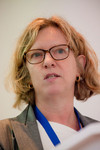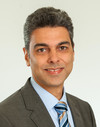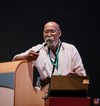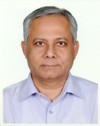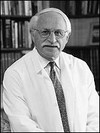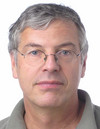|
Rolf Klemm, Helen Keller International (HKI), USA:"Micronutrient programs in a changing landscape" | Rolf DW Klemm, MPH, DrPH, Vice President of Nutrition, is a nutritional epidemiologist with 30 years of professional experience in international public health nutrition with expertise in the design, evaluation and management of nutrition interventions to improve maternal and child health and survival including dietary interventions, infant and young child feeding strategies, food fortification and micronutrient supplementation. Dr. Klemm has served as Country Director for HKI in the Philippines, Senior Technical Advisor and Technical Director of USAID’s flagship A2Z micronutrient project, and maintains his faculty appointment as Senior Associate at the Johns Hopkins Bloomberg School of Public Health. He has published extensively in scientific journals articles, and is principle instructor of the Food and Nutrition Policy course at Hopkins. As VP Nutrition for HKI, he represents the organization at major global scientific meetings and expert groups, and provides scientific and technical leadership to HKI’s regional and country offices. |
|---|
|
|
Lawrence Haddad, Global Alliance for Improved Nutrition (GAIN), Switzerland:"How can businesses and actors in the public sector better work together to advance nutrition status?" | Lawrence Haddad is the Executive Director of the Global Alliance for Improved Nutrition (GAIN). Prior to this he was a Senior Research Fellow at the International Food Policy Research Institute (IFPRI) where he served as the Co-Chair of the Global Nutrition Report from 2014-2016. From 2004-2014 Lawrence was the Director of the Institute of Development Studies (IDS) in the UK and a Professor of Development Studies. He was the UK’s representative on the Steering Committee of the High Level Panel of Experts (HLPE) of the UN's Committee on World Food Security (CSF) from 2009-2011. He was the President of the UK and Ireland's Development Studies Association from 2010 to 2012. Before joining IDS Lawrence was Director of the Food Consumption and Nutrition Division at IFPRI from 1994-2004. Prior to this he was was a lecturer in quantitative development economics at the University of Warwick. He has also been a visiting scholar at the London School of Economics. His work focuses on a wide range of issues related to the well- being of the poor, including the design of policies and programs intended to reduce poverty and malnutrition, the impact of gender difference in access to resources on nutrition and poverty, the role of community participation in the performance of poverty programs, and the challenges rapid urbanization poses for food security and nutrition. He has published extensively on these issues. Lawrence completed his PhD in Food Research from Stanford University in 1988. |
|---|
|
|
Detlev Grimmelt, Fairtrade Deutschland, Germany:"Empowering smallholders and strengthening rural communities – the Fairtrade approach to combat hidden hunger and poverty" | Member of the Board TransFair e.V. / Fairtrade.
Detlev Grimmelt looks back at 25 years of experience in the field of Fast Moving Consumer Goods (FMCG). Having completed his studies in business administration, he started to gain first professional experience at the coop group. He then held different marketing and sales positions at the dairy company Arla Foods for 18 years before he became CEO of Finefood Alliance. Since 2011 Detlev Grimmelt has been working for TransFair e.V. (Fairtrade Germany). As a member of the executive board he is in charge of TransFair’s Marketing and Sales Department. Furthermore, he is Fairtrade Germany’s contact to the Asian and Pacific Producer Network and a member of Fairtrade’s International Finance Committee which controls finances and participates in developing strategies to align and ensure the distribution of money to interest groups in the Global South.
TransFair e.V. is a non-profit association which was founded in 1992. As German member organization of Fairtrade International TransFair e.V. is also called Fairtrade Germany. A team of more than 50 people contributes to establishing Fairtrade in the German economy and society. Fairtrade connects consumers, businesses and producer organizations in the Global South. Fairtrade changes trade by means of fairer prices for small scale producers and more humane working conditions for small scale farmers as well as workers on plantations. |
|---|
|
|
Sarah Schneider, Bischöfliches Hilfswerk MISEREOR e.V., Germany:"Structural causes of malnutrition and alternative solutions for sustainable food systems" | Sarah Schneider is working as Advocacy Officer on food and agriculture for the German NGO MISEREOR, with a special focus on agroecology and nutrition. She looks at the structural causes of hunger and malnutrition and promotes holistic approaches to create healthy and sustainable food systems, in collaboration with NGOs in the global South. Before joining MISEREOR, she has worked at the FAO Regional Office for Latin America and the Caribbean, supporting the International Year for Family Farming and accompanying studies on short supply chains and public procurement. Sarah studied International Development at the University of Vienna and wrote her thesis about urban agriculture and political reforms in Cuba. She has work and research experience in Peru, Cuba and Chile. |
|---|
|
|
Paul Armbruster, Germany:"The role of cooperation to improve smallholder livelihoods" | Trained and certified Banker. Volunteer in Rural Cooperative Projects in Bolivia and Ecuador. Studies in economics and business administration at Mannheim University, Graduate in Economics. Assistant Professor University of Mannheim. PhD in Business Administration. Researcher in the Research Institute for International Agriculture in Heidelberg. Consultant for national and international Organizations. 1988-2014 Head of the International Relations Department in the Deutscher Genossenschafts- und Raiffeisenverband e.V. (DGRV)/German Cooperative Confederation. 2002-2013 General Secretary of the International Raiffeisen Union (IRU) Member of different official working groups and foundations. Senior Consultant in Cooperatives, Farmer's Associations Rural Finance and Rural Development. |
|---|
|
|
Mirjana Gurinović, University of Belgrade, Serbia:"Diet Assess & Plan (DAP) software for dietary intake assessment in supporting public health nutrition research in Central Eastern European Countries (CEEC)" | Mirjana Gurinović MD, PhD in nutrition, Scientific Research Advisor, FAO Expert TCDC/TCCT and Nutrition consultant FAOREU, EFSA Hearing Expert working at the Centre of Research Excellence in Nutrition and Metabolism ,Institute for Medical Research, University of Belgrade, Serbia www.srbnutrition.info is an experienced scientist who is actively engaged in research on nutrition, food composition, micronutrient recommendations, public health nutrition and epidemiology, dietary intake and nutritional status assessment, diet and health. She has considerable experience in co-coordinating national projects and has led a national study of atherosclerotic risk factors, nutritional status and the nutrition quality of diet in school children, as well as dietary quality and health status in the adult population in Serbia. She was the WHO Nutrition counterpart for Serbia and National coordinator for Nutrition action plan for nutrition and strategy for obesity prevention in Serbia, and has collaborated over a number of years with FAO, the regional office in Budapest. She has over 300 published peer-review papers, abstracts, and reports in national and international journals. She also created several software’s for food composition data base management, dietary intake assessment, nutrition planning and diet modeling with the possibility to link with monitoring of the nutritional status of a population. She was also involved as focal point for the FAO International Year of Pulses 2016 celebration, national, regional and global dialogue. Dr Gurinović is a member of a number of professional associations including: ILSI Europe, Dietary intake and exposure task force, expert group member “Evaluation of new methods for dietary intake assessment”, Nutrition Expert Group in European Heart Network, founding member of the World Public Health Nutrition Association (WPHNA), International Scientific Committee of Choices International Foundation (ISC) and many others. She is a Chair of the Capacity Development Network in Nutrition in Central and Eastern Europe, (NCDNCEE/CAPNUTRA) (www.capnutra.org) and contributed to food nutrition capacity development in this region. She was actively involved in several EC FP6 /FP7 NoE projects, including EURRECA, EuroFIR, EFSA projects, BaseFood, CHANCE, EuroFIR-Nexus, ODIN, Bacchus, and Project advisory board (PAB) member in Euro DISH- "Study on the need for food and health research infrastructures in Europe”.
Personal home page: http://srbnutrition.info/english/portfolio/dr-mirjana-gurinovic-naucni-savetnik/ |
|---|
|
|
SYMPOSIUM 5: A SHORT TRIP TO ASIA Sabine Gabrysch, University of Heidelberg, Germany:"Food-based approaches to Hidden Hunger: The Food and Agricultural Approaches to Reducing Malnutrition (FAARM) project in Bangladesh"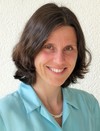 | Sabine Gabrysch is Deputy Head of the Institute of Public Health at Heidelberg University and Head of the Institute's Unit of Epidemiology and Biostatistics, as well as a Honorary Lecturer at the London School of Hygiene & Tropical Medicine. She has been elected to the Board of the German Society of Epidemiology and the Heidelberg Centre for the Environment. Sabine holds a medical degree from the University of Tübingen and an MSc and PhD in Epidemiology from the London School of Hygiene & Tropical Medicine. She worked as a medical doctor in Sweden and Ethiopia and as a consultant to GIZ. Her area of research is global maternal and child health. Among other awards and fellowships, Sabine has been a Margarete von Wrangell fellow and worked on geographic access to care and quality of care at childbirth in Ghana. Since 2013, she leads a BMBF-funded Junior Scientist Group conducting the six-year research project “Food and Agricultural Approaches to Reducing Malnutrition” (FAARM). The project entails a cluster-randomized trial among 2600 women in 96 villages of rural Bangladesh, evaluating the impact of Helen Keller International’s Homestead Food Production program on chronic undernutrition in women and young children. |
|---|
|
|
SYMPOSIUM 5a: EXCURSION TO NEPAL Stella Deetjen, Back to Life e.V., Germany: "The forgotten people of Mugu (Nepal): Strategies against hunger and other challenges" | It was 20 years ago, right after leaving school, when Stella Deetjen, founder and chairwoman of the NGO "Back to Life", started her work with a social programme in Benares (Varanasi/India) – to help needy people with a background of leprosy. Till today the non-profit organization inaugurated three children’s homes and 13 (non-formal) slum schools in Benares. Since 2009, Back to Life also takes care about three project areas in Nepal: One of them is the lonely mountain area "Mugu" in the west of Nepal – home of the "Forgotten people". Here it’s a permanent fight against one of the highest maternal and infant mortality rates of the world. The NGO constructed already six birth centres to support the woman of Mugu. Also nine schools obtained new school buildings to enable better carreer chances to the children. At the moment, Back to Life is reconstructing six schools in the area of "Nuwakot" which were destroyed by the earthquakes of 2015. In 2016, Stella Deetjen released a book about her first years in Benares and the start of the project work of Back to Life: It’s called "Unberührbar" ("Untouchable"). She is often invited by German TV and radio shows to speak about her work. |
|---|
Marisa Schroth, Govinda Entwicklungshilfe e.V., Germany/Nepal:"Multi-facet approach to fight malnutrition in Nepal" | Marisa Schroth studied nutrition (B.Sc.) and organic agriculture (M.Sc.) at the University of Hohenheim. She works now for an organic certification company. Since 2010 she's a member of Govinda e.V. During her studies she spent five month volunteering in the projects of the NGO in Nepal. Her main task was to analyze the nutrient uptake of the orphans. Based on the results she developed recommendations. Amendments of the food plan were made together with the kitchen team. She is now monitoring and consulting the SDA teams in agriculture and nutrition issues. In December 2016, she was honored with the German Engagement Award. |
|---|
|
|
SYMPOSIUM 5b: EXCURSION TO INDIA Nivedita Varshneya, Welthungerhilfe e.V., India:"Linking Agriculture and Natural Resource Management towards Nutrition Security (LANN+) – a nutrition-sensitive multi-sector approach" | Nivedita Varshneya has been the Country Director of Welthungerhilfe India since 2014 and has been working with Welthungerhilfe since 10 years in different positions. Prior to Welthungerhilfe, she has worked with national level NGOs, CSRs and the Ministry of Rural Development in India on issues related to food security and sovereignty, sustainable agriculture, forestry and natural resource management, strengthening civil society and improved governance.
Nivedita has a master’s degree in forest management and has received awards for studies abroad, including Wageningen University. Currently, she is a member of several professional societies and networks in India. |
|---|
Debjeet Sarangi, Living Farms, India: "Uncultivated forest foods as rich sources of micro nutrients" 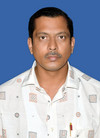 | Debjeet Sarangi is the Managing Trustee of Living Farms, a NGO in Odisha, India. He has been working with indigenous communities since 1991. Living Farms has been involved in mobilising communities in 2500 villages covering a population of more than 700,000 to reclaim their local food system. Living Farms supports communities to partner with institutional scientists and Universities on collaborative research to evolve locally appropriate solutions to address malnutrition. Living Farms has been involved in understanding how forests are an important source of nutrition.
Debjeet is a Sustainability Fellow at University of California, Irvine and was appointed Transform Nutrition Champion in 2016. He has studied Economics, Sociology, and Governance Reforms and trained in Sustainable Agriculture, Permaculture, and Linking Agriculture, Natural Resource and Nutrition (LANN). |
|---|
Ravinder K. Soni, Dayanand Medical College & Hospital Ludhiana, India:"The Nutrition Paradox in India: The coexistence of undernutrition and overnutrition"
| Dr Ravinder Kumar Soni is working as Professor in the Department of Community Medicine, Dayanand Medical College and Hospital, Ludhiana, India with his 29 years of experience in academics and research. He has received MAMS award for excellent contribution towards Medical research from National Academy of Medical Sciences, FSMS for enhancing the skills and research in Statistics by Indian Society for Medical Statistics and Health care excellence award for Best Teacher by The Indus Foundation USA and India. He has 62 research publications in various National and International journals. He has attended 29 National and 16 International Conferences in India and different countries. He has done WHO course on Health System Research and National course on Educational Science Technology for the Teachers of Health Professional besides other professional courses/trainings on Nutrition research. He has been resource faculty for many workshops/ symposiums on nutrition research at different parts of the country. He has also done Multidisciplinary Training of Trainers in Child Protection conducted by International Society for Prevention of Child Abuse and Neglect.
He has been the Principal Investigator of the Multicentric Task Force Study on Consumption Pattern of Carbonated Soft Drinks of Indian Population at Different times of the year. He is Life member of various scientific bodies like International Epidemiological Association, Nutrition Society of India, Indian Association of Preventive & Social Medicine, Indian Science Congress, Indian Maternal and Child Health Association and Indian Society of Medical Statistics. He has been the Independent Monitor on behalf of WHO for various NID & SNID rounds of Pulse Polio Immunization in India for more than 10 years. |
|---|
Monika Golembiewski, Shining eyes e.V., Germany/India:"Community based nutrition programs for children aged 6-36 months and pregnant and lactating women to decrease anaemia and stunting prevalences in Bolpu, West bengal, India" | For the last 22 years, the paediatrician Dr. med. Monika Golembiewski has been working in Bolpur, West Bengal, India, as a volunteer to improve the health of children and their mothers. She founded the charitable society "Shining Eyes - medical first aid for children and socio economic village devel-opment in India" and with her efforts a preventive health care centre could be inaugurated in 2011. This hospital is the centre of a preventive village work, where awareness trainings are conducted, village health workers are trained and kitchen gardens are being planted to enrich the monotonous diets of the Santals, who belong to the native inhabitants of India. In 2007 her daughter-in-law Silvia Golembiewski (development economist) joined this development work and mutually first nutrition programmes for children and mothers have been initiated. Meanwhile Caroline Stiller, nutritionist, from Hohenheim University joined the project and the nutrition programmes could be further optimized with her help. Since 2015 we run nutrition programmes in 14 villages to analyze the effectiveness of these community based cooking centres, where mothers are trained to prepare local foods for their children. To cover the children's' micronutrient needs, rather a micronutrient sprinkle or a locally produced leaf powder of Moringa and Amaranthus is mixed in the cooked meals. Therewith, we strive to decrease the still alarmingly high prevalences of anaemia and stunting amongst these children and mothers. |
|---|
Rolf Bucher, Germany:"Working with Santal Villagers, West Bengal, India: Moringa and Kitchen Gardens to combat malnutrition"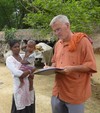 | Rolf Bucher has aquired the methods of organic and biodynamic agriculture in the late 1970s and has been practising them ever since. As farm manager for WALA/Dr.Hauschka Cosmetics (Germany) for more than 30 years he not only cultivated medicinal plants organically, but also gave workshops and trained agricultural students. Rolf Bucher is founding member and board director of “Hortus officinarum“, an organisation, whose aims are to preserve biodynamically or organically grown seeds of medicinal plants and to grow new cultivars.
In close cooperation with GLS Zukunftsstiftung Entwicklung (Germany), he and his partner Anne Bucher have been working in rural development and education since 2011.
Their main assignments so far:
- cooperating with small-holder farmers in India, Kenya, Vietnam and Zimbabwe
- workshops for students at Biodynamic Farm School (India)
- development of a school farm at Mbagathi Steiner School (Kenya)
- workshops for the East African Waldorf Teacher Training (Kenya)
|
|---|
|
|
SYMPOSIUM 6: A short trip to Africa Belem Tounaba Boukary, ProgettoMondo Mlal, Burkina Faso:"Nutrition Educational Cells (NEC), a community based approach to fight against child undernutrition and strength community resilience, in rural area in Burkina Faso" | Dr BELEM Tounaba Boukary MD, MPH, Health and nutrition coordinator of ProgettoMondo Mlal in Burkina Faso, West Africa. Dr BELEM holds a Doctorate degree in medicine of Ouagadougou University, a Master Degree in Public Health at Aix Marseille University and a University Degree in epidemiology and statistics methods at Bordeaux University. Regarding his last ten years experience, He worked mainly on access to primary health and nutrition services, including implementing and monitoring community health and nutrition programs in rural area, strengthening community participation to health services, involving stakeholders into health and nutrition projects implementation at local and intermediary levels of health system, contributing to policy development and evaluation in the field of community health. He is also interested particularly in development, testing and evaluation of effective integrated approaches of community involvement in health & nutrition programs including management of acute malnutrition and promotion of infant and young child nutrition good practises in african rural area. |
|---|
Claudia Hensel, University of Mainz, Germany:
"Students fight hidden hunger in Zambia - A mulitlevel approach to establish Enset - The tree against hunger" | Prof. Dr. Claudia Hensel is Professor for International Marketing at the University of Applied Sciences Mainz, Germany
Profile:
- Research Focus on Strategy & Marketing in Emerging and Underserved Markets, Trend & Innovation, Corporate Social Responsibility & Company Ethics, Change Management
- Extensive work experiences in International Marketing and Marketing Research in an American Blue Chip Company in the European Headquarter, Reigate, UK, Market Responsibilities for Benelux, France, UK
- Industry Insights through supervised Change Management Projects in Executive MBA Programmes in Russia, Romania, Iran, Ethiopia and Germany in Pharmaceutical & Chemical Industry, IT, Banking & Insurances, Public Sector, FMCG and Industrial Products
- Market Insights through research projects and lecturing in China, Argentina, Iran, Russia, Rwanda, Romania and Ethiopia
- Kurt-Dörr Award 2012
- Founder of SEMAY® Association, Vision: „We believe that the world would be a better place if students around the world cared more about others“
Publications:
- Hensel, Claudia (2015): Corporate Social Responsibility (CSR) in Theorie, Praxis und Lehre, in: Update, HS Mainz.
- Hensel, Claudia (2015): CSR (Corporate Social Responsibility), in: Evangelisches Soziallexikon, 9.Auflage, Kohlhammer.
- Hensel, Claudia (2012): SARI – a framework for sustainable learning, conference paper, “TEACHING IS TOUCHING THE FUTURE. EMPHASIS ON SKILLS”, JOHANNES GUTENBERG-UNIVERSITYMAINZ, 29.-30.11.2012.
- Hensel, Claudia (2011): Minimissions in Ethiopia, in: Legrand,Willy/Simons-Kaufman, Claudia/Sloan Philip: Sustainable Hospitality as a Driver for Equitable Development: Case Studies from Developing Regions of the World, Taylor & Francis.
- Hensel, Claudia (2005): Der Einfluss von Erlebnissen auf den Kaufentscheidungsprozess – am besonderen Beispiel der Industriegütermessen, Shaker.
|
|---|
Daniel Knoblauch, Enactus Aachen e.V., Germany: "Samaki - An innovative approach to farm fish in rural Africa"  | Daniel Knoblauch is the president of Enactus Aachen e.V. He studies industrial engineering in his first master semester at the RWTH Aachen university in Aachen. With his team of 90 students from various faculties he is trying to improve the lives of people in need with an economical approach. For one their projects Samaki, an innovative approach to farm fish in rural Africa, Daniel established a fish farm in Livingstone, Sambia. Currently the team is operating 5 fish farms in Uganda, Benin and Sambia. Daniel was one of the presenters at the Enactus World Cup, where the Enactus Aachen achieved an outstanding 3rd place. |
|---|
|
|





